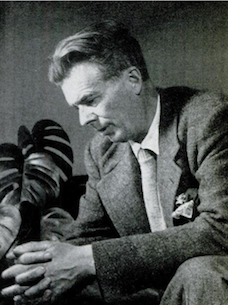main page | 20th-century literature | other 20th-century british fiction | about literaryhistory.com

public domain photo of Aldous Huxley
Aldous Huxley (1894-1963)
A selective list of online literary criticism and analysis for the twentieth-century English novelist and essayist Aldous Huxley, favoring signed articles by recognized scholars and articles published in peer-reviewed sources
brief biography
Aldous Huxley was born in Godalming, Surrey, England into an intellectually distinguished family. His father was a master at the famous English public school, Charterhouse School, his half-brother was a Nobel Prize winning physiologist, and his grandfather was Thomas Henry Huxley, the nineteenth century biologist known as the principal proponent in England of Darwin's theory of evolution. His great-grandfather was Dr. Thomas Arnold, the famous educator at Rugby School, which made Aldous also the great-nephew of Matthew Arnold.
Huxley was educated at Eton and Oxford. His family was not wealthy, and after college he had to be self-supporting. Because of an eye disease he was forced to abandon his first choice of profession, to be a doctor. He briefly tried school teaching, then decided to try to make his living as a writer. Eventually he established himself as a major author with four novels that satirized the social decadence of 1920s London: Crome Yellow (1921), Antic Hay (1923), Those Barren Leaves (1925), and Point Counter Point (1928). His best known novel is Brave New World (1932), the portrait of a nightmarish twenty-fifth century Utopia.
In 1937 he moved to Southern California, where he became a screenwriter and turned his attention to mysticism, Eastern thought, and mind-altering drugs. He wrote about his experiences with the hallucinogenic drug mescaline in 1954 in The Doors of Perception. The title was taken from lines in The Marriage of Heaven and Hell, a poem by William Blake.
If the doors of perception were cleansed
every thing would appear to man as it is: Infinite.
For man has closed himself up, till he sees
all things thro' narrow chinks of his cavern.
introduction
Mike Wallace interviews Aldous Huxley, 1958. A heavy-handed Mike Wallace begins, "This is Aldous Huxley, a man haunted by a vision of hell on earth." In the interview Huxley warns of the misuses of technology. Youtube video, 29 minutes.
"The Talented Mr. Huxley." An extended feature article on Huxley's life, books, and travels, from Humanities Magazine Nov./Dec. 2015.
"Out of Sight: The curious career of Aldous Huxley." The New Yorker 17 March 2003.
"Everybody is happy now." Margaret Atwood, author of the dystopian The Handmaid's Tale, writes on Huxley's dystopian Brave New World, in The Guardian, 17 Nov. 2007.
"Aldous Huxley." An admiring interview with Aldous Huxley, in 1960, in which he discusses his writing habits and his current book project, Island. Huxley describes this as "a kind of reverse Brave New World, about a society in which real efforts are made to realize human potentialities. I want to show how humanity can make the best of both Eastern and Western worlds." Paris Review 23 (Spring 1960).
Derbyshire, John. "What Happened to Aldous Huxley?" New Criterion 21, 6 (Feb. 2003).
Nordgren, Joe. "Aldous Huxley." A substantial introduction to Aldous Huxley, from the Literary Encyclopedia, 19 July 2005 [subscription service].
literary criticism: Brave New World
Buchanan, Brad. "Oedipus in Dystopia: Freud and Lawrence in Aldous Huxley's Brave New World." Journal of Modern Literature 25, 3/4 (Summer 2002) pp 75-89 [free at jstor].
Patty, James S. "Baudelaire and Aldous Huxley." On Aldous Huxley's deep knowledge of French literature and the Baudelairian element in his novel Point Counter Point. South Atlantic Bulletin 33, 4 (Nov., 1968), pp. 5-8 [free at jstor].
Posner, Richard A. "Orwell versus Huxley: Economics, Technology, Privacy, and Satire." John M. Olin Program in Law and Economics Working Paper No. 89, 1999)[open acccess].
Saunders, Judith P.; and Victoria Ingalls. "Evolutionary Science and Literary Design: Teaching Huxley's Brave New World in Interdisciplinary Collaboration." Style 47, 2 (Summer 2013), pp. 239-260 [free at jstor].
Schmerl, Rudolf B. "The Two Future Worlds of Aldous Huxley." On the techniques used in constructing an imaginary world, and how such fantasies function as satires of the real worlds they reflect, in Brave New World and Ape and Essence. PMLA 77, 3 (June 1962) pp 328-34 [free at jstor].
literary criticism: other works
Beauchamp, Gorman. "Island: Aldous Huxley's Psychedelic Utopia." Utopian Studies 1, 1 (1990) pp 59-72 [free at jstor].
Bentley, Joseph. "Huxley's Ambivalent Responses to the Ideas of D. H. Lawrence." Twentieth Century Literature 13, 3 (Oct. 1967) pp 139-53 [free at jstor].
Enroth, Clyde. "Mysticism in Two of Aldous Huxley's Early Novels." Twentieth Century Literature 6, 3 (Oct. 1960) pp 123-32 [free at jstor].
Meckier, Jerome. "Housebreaking Huxley: Saint Versus Satirist." Mosaic: An Interdisciplinary Critical Journal 5, 4 (Summer, 1972), pp. 165-177 [free at jstor].
Meckier, Jerome. "Shakespeare and Aldous Huxley." Shakespeare Quarterly 22, 2 (Spring 1971) pp 129-35 [free at jstor].
Snyder, Carey. "'When the Indian Was in Vogue': D.H. Lawrence, Aldous Huxley, and Ethnological Tourism in the Southwest." Modern Fiction Studies 53, 4 (Winter 2007), pp. 662-696 [free at jstor].
Vitoux, Pierre. "Aldous Huxley and D. H. Lawrence: An Attempt at Intellectual Sympathy." On the period of his writing when Huxley was under the influence of D.H. Lawrence and Jungian psychology. The Modern Language Review 69, 3 (July, 1974), pp. 501-522 [free at jstor].
Watt, Donald J. "The Criminal-Victim Pattern in Huxley's Point Counter Point." Studies in the Novel 2, 1 (Spring 1970) pp 42-51 [free at jstor].
main page | 20th-century literature | 20th-century British fiction | about literaryhistory.com
1998-2018 by Jan Pridmore
